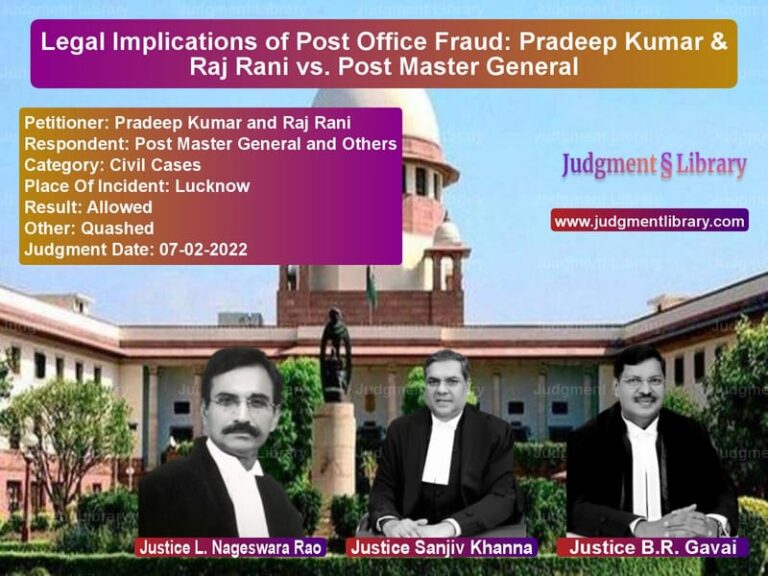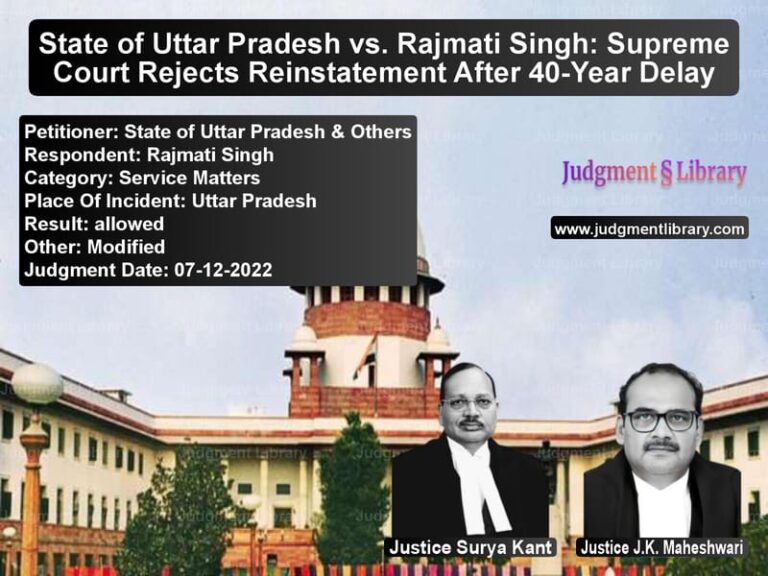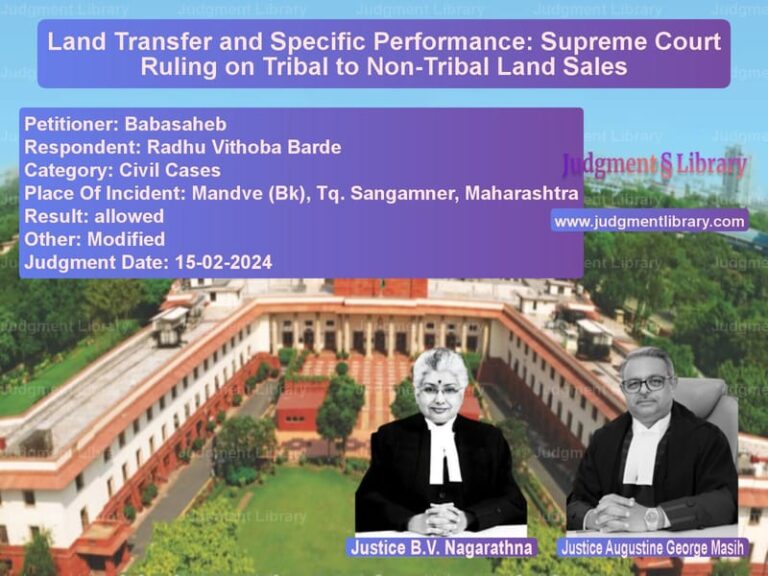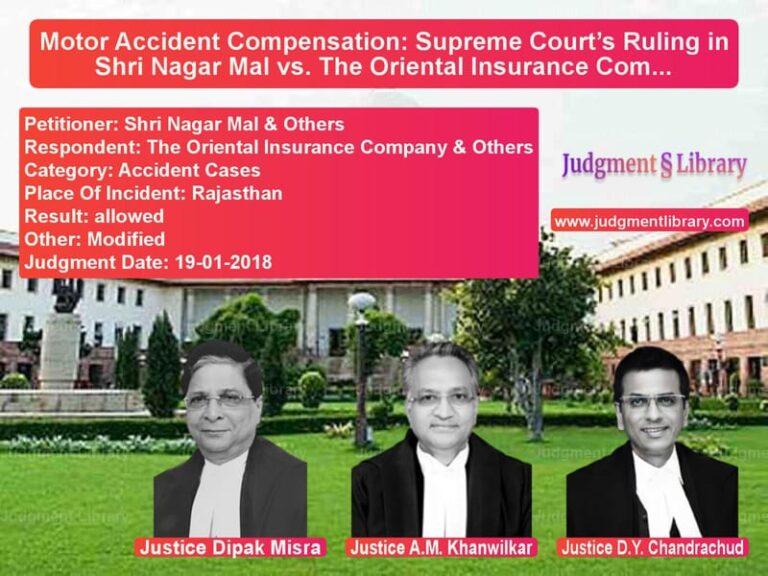Covid-19 Compensation: Supreme Court Directs Government to Provide Ex Gratia Assistance
The case of Reepak Kansal v. Union of India and Gaurav Kumar Bansal v. Union of India addressed a critical issue concerning the provision of ex gratia monetary compensation to the families of those who succumbed to Covid-19. The petitioners argued that under Section 12 of the Disaster Management Act, 2005 (DMA 2005), the government had a legal obligation to compensate the families of the deceased. The Supreme Court, after thorough consideration, directed the National Disaster Management Authority (NDMA) to frame guidelines for such compensation.
Background of the Case
The petitions were filed as Public Interest Litigations (PILs), seeking directions to the Central and State Governments to:
- Provide ex gratia compensation of Rs. 4 lakhs or another suitable amount to families of Covid-19 victims under the provisions of DMA 2005.
- Ensure the issuance of accurate death certificates stating Covid-19 as the cause of death.
- Provide social security and rehabilitation to the families affected by Covid-19.
Arguments Presented
Petitioner’s Arguments
The petitioners, represented by Shri S.B. Upadhyay and Gaurav Kumar Bansal, argued that:
- Covid-19 was classified as a “Notified Disaster” under the DMA 2005, making it mandatory for the government to provide compensation.
- Under Section 12 of DMA 2005, the National Authority is required to recommend guidelines for minimum standards of relief, including ex gratia assistance.
- Compensation for other disasters, such as earthquakes and floods, had been provided in the past, making Covid-19 victims’ families equally eligible.
- Failure to provide ex gratia assistance violated the fundamental right to life under Article 21 of the Constitution of India.
- The government’s argument that Covid-19 was an ongoing disaster did not justify denying financial assistance.
- Financial constraints should not be an excuse for denying statutory relief, as previously established in Swaraj Abhiyan v. Union of India and other landmark cases.
Respondent’s Arguments
The Union of India, represented by Solicitor General Tushar Mehta, opposed the petition, stating:
- The government had taken multiple steps to combat Covid-19, including infrastructure development, vaccination programs, and financial relief for vulnerable populations.
- Providing ex gratia compensation to all Covid-19 victims’ families would impose a massive financial burden on the exchequer.
- The DMA 2005 did not mandate a fixed compensation amount for each disaster, allowing the government flexibility in determining relief measures.
- Covid-19 was an ongoing pandemic, requiring continuous financial allocation for healthcare, infrastructure, and economic recovery.
- Various financial schemes, including the Pradhan Mantri Garib Kalyan Package (PMGKP), had already been implemented.
- Issuing uniform compensation would create disparities, as different states had announced their own relief packages.
Supreme Court’s Observations and Ruling
The Supreme Court, led by Justices Ashok Bhushan and M.R. Shah, delivered a landmark ruling. The Court considered the scope of judicial review in policy matters and the government’s obligations under the DMA 2005. The key observations were:
Interpretation of Section 12 of DMA 2005
- The word “shall” in Section 12 of DMA 2005 makes it mandatory for the NDMA to frame guidelines for ex gratia assistance.
- The government cannot evade its statutory duty by arguing that Covid-19 is an ongoing disaster.
- The DMA 2005 does not specify a fixed amount, but some form of compensation is required.
Financial Constraints Cannot Justify Denial of Compensation
- The Court recognized that fiscal planning is a government function but emphasized that financial limitations do not absolve statutory responsibilities.
- Previous disasters such as earthquakes and floods had financial relief provisions, and the same principle should apply to Covid-19 victims.
Issuance of Death Certificates
- The Court acknowledged that many families were facing difficulties in obtaining death certificates that correctly stated Covid-19 as the cause of death.
- The government was directed to issue simplified guidelines ensuring that death certificates accurately reflect Covid-19 as the cause of death.
- The guidelines must provide a mechanism for correcting previously issued inaccurate certificates.
Directions Issued by the Supreme Court
The Supreme Court issued the following key directives:
- NDMA must frame guidelines within six weeks for providing ex gratia assistance to families of Covid-19 victims.
- The amount of compensation will be decided by the NDMA, considering financial constraints and other relief measures.
- Death certificates must be updated to accurately state Covid-19 as the cause of death, with a mechanism for corrections.
- The government must consider social security measures, such as insurance schemes, for disaster victims.
Impact of the Judgment
The Supreme Court’s ruling establishes a crucial precedent in disaster management and government accountability. The ruling ensures:
- Recognition of Covid-19 as a national disaster requiring financial assistance.
- A uniform framework for ex gratia compensation across states.
- Transparency in death certification processes.
- Potential for further relief measures based on financial feasibility.
Conclusion
The Supreme Court’s directive to provide ex gratia compensation marks a significant step in ensuring relief for Covid-19 victims’ families. While the government retains discretion over the exact amount, the judgment reinforces that financial constraints cannot override statutory obligations. This ruling upholds the principles of fairness, transparency, and social justice in disaster management policies.
The appeal was allowed, directing the government to implement the Court’s directives within a specified timeframe.
Petitioner Name: Reepak Kansal, Gaurav Kumar Bansal.Respondent Name: Union of India and others.Judgment By: Justice Ashok Bhushan, Justice M.R. Shah.Place Of Incident: India.Judgment Date: 30-06-2021.
Don’t miss out on the full details! Download the complete judgment in PDF format below and gain valuable insights instantly!
Download Judgment: reepak-kansal,-gaura-vs-union-of-india-and-o-supreme-court-of-india-judgment-dated-30-06-2021.pdf
Directly Download Judgment: Directly download this Judgment
See all petitions in Public Interest Litigation
See all petitions in Compensation Disputes
See all petitions in Judgment by Ashok Bhushan
See all petitions in Judgment by Mukeshkumar Rasikbhai Shah
See all petitions in allowed
See all petitions in supreme court of India judgments June 2021
See all petitions in 2021 judgments
See all posts in Civil Cases Category
See all allowed petitions in Civil Cases Category
See all Dismissed petitions in Civil Cases Category
See all partially allowed petitions in Civil Cases Category







